 W
WIn Greek mythology, Achilles or Achilleus was a hero of the Trojan War, the greatest of all the Greek warriors, and is the central character of Homer's Iliad. He was the son of the Nereid Thetis and Peleus, king of Phthia.
 W
WThe relationship between Achilles and Patroclus is a key element of the stories associated with the Trojan War. Its exact nature has been a subject of dispute in both the Classical period and modern times. In the Iliad, Homer describes a deep and meaningful relationship between Achilles and Patroclus, where Achilles is tender toward Patroclus but callous and arrogant toward others. Homer never explicitly casts the two as lovers, but they were depicted as lovers in the archaic and classical periods of Greek literature, particularly in the works of Aeschylus, Aeschines and Plato.
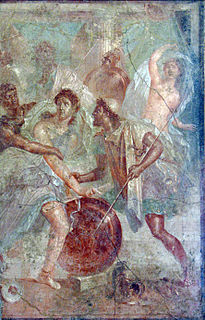 W
WAchilles on Skyros is an episode in the myth of Achilles, a Greek hero of the Trojan War. Not existing in Homer's epic poem Iliad, the episode is written down in detail in some later versions of the story, particularly the Achilleid by the Roman poet Statius. The story of how Achilles disguised himself as a girl at the court of the king of Skyros, fell in love with one of the princesses, and married her before leaving for Troy, became a popular topic in arts and literature from Classical times until the middle of the 20th century. The carnavalesque disguises and gender transpositions at the heart of the story were particularly popular in opera, with over 30 different operas on the theme between 1641 and 1857.
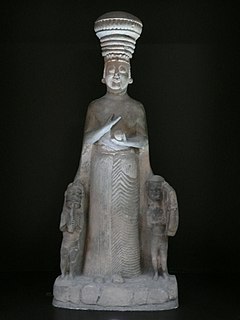 W
WAgdistis was a deity of Greek, Roman and Anatolian mythology, possessing both male and female sexual organs. She is closely associated with the Phrygian goddess Cybele.
 W
WIn Greek mythology, Ameinias was a young man who fell in love with the beautiful Beotian hunter Narcissus, who had already spurned his male suitors, according to the version of Narcissus's myth by Conon.
 W
WAmpelos or Ampelus (Latin) was a personification of the grapevine and lover of Dionysus in Greek and Roman mythology. He was a satyr that either turned into a Constellation or the grape vine, due to Dionysus.
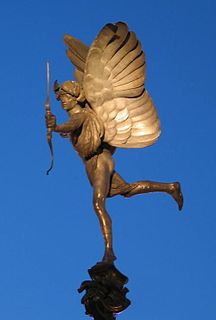 W
WIn Greek mythology, Anteros was the god of requited love and also the punisher of those who scorn love and the advances of others, or the avenger of unrequited love. He is one of the Erotes.
 W
WApollo is one of the Olympian deities in classical Greek and Roman religion and Greek and Roman mythology. The national divinity of the Greeks, Apollo has been recognized as a god of archery, music and dance, truth and prophecy, healing and diseases, the Sun and light, poetry, and more. One of the most important and complex of the Greek gods, he is the son of Zeus and Leto, and the twin brother of Artemis, goddess of the hunt. Seen as the most beautiful god and the ideal of the kouros, Apollo is considered to be the most Greek of all the gods. Apollo is known in Greek-influenced Etruscan mythology as Apulu.
 W
WIn Book V of Ovid's mock-epic Metamorphoses, Athis is a young demigod of outstanding beauty from India, son of Limnaee, a nymph of the Ganges.
 W
WIn Greek mythology, Caeneus was a Lapith hero of Thessaly.
 W
WThe Boreads are the "wind brothers" in Greek mythology. They consist of Zetes and Calaïs. Their place of origin was Thrace, home of their father Boreas.
 W
WIn Greek mythology, Callisto or Kallisto was a nymph, or the daughter of King Lycaon; the myth varies in such details. She was one of the followers of Artemis who attracted Zeus. According to some writers, Zeus transformed himself into the figure of Artemis to lure Callisto and seduce her. She became pregnant and when this was eventually discovered, she was expelled from Artemis's group, after which a furious Hera, the wife of Zeus, transformed her into a bear. Later, just as she was about to be killed by her son when he was hunting, she was set among the stars as Ursa Major. She was the bear-mother of the Arcadians, through her son Arcas by Zeus.
 W
WIn Greek mythology, Chrysippus was a divine hero of Elis in the Peloponnesus (Greece), sometimes referred to as Chrysippus of Pisa.
 W
WIn Classical mythology, Crocus was a mortal youth who was changed by the gods into a saffron flower.
 W
WIn Greek mythology, Cycnus or Cygnus, was a son of Apollo by Hyrie or Thyrie, daughter of Amphinomus.
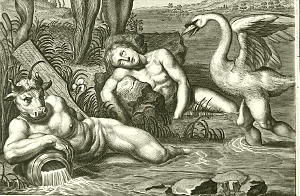 W
WIn Greek mythology, Cycnus or Cygnus, was a king of Liguria, a beloved and kin of Phaethon, who lamented his death and was subsequently turned into a swan and then a constellation.
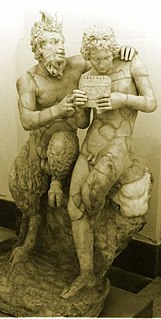 W
WIn Greek mythology, Daphnis was a Sicilian shepherd who was said to be the inventor of pastoral poetry.
 W
WDionysus is the god of the grape-harvest, winemaking and wine, of fertility, orchards and fruit, vegetation, insanity, ritual madness, religious ecstasy, festivity and theatre in ancient Greek religion and myth.
 W
WIn Greek mythology, Eros is the Greek god of love and sex. His Roman counterpart was Cupid ("desire"). In the earliest account, he is a primordial god, while in later accounts he is described as one of the children of Aphrodite and Ares and, with some of his siblings, was one of the Erotes, a group of winged love gods.
 W
WIn Ancient Greek religion and mythology, the Erotes are a collective of winged gods associated with love and sexual intercourse. They are part of Aphrodite's retinue. Erotes is the plural of Eros, who as a singular deity has a more complex mythology.
 W
WIn Greek mythology, Ganymede or Ganymedes is a divine hero whose homeland was Troy. Homer describes Ganymede as the most beautiful of mortals, abducted by the gods, to serve as Zeus's cup-bearer in Olympus.[Ganymedes] was the loveliest born of the race of mortals, and thereforethe gods caught him away to themselves, to be Zeus' wine-pourer,for the sake of his beauty, so he might be among the immortals.
 W
WIn Greek mythology, Glaucus was a Cretan prince.
 W
WGynomorph is a word used to describe an organism with female physical characteristics.
 W
WHermes is an Olympian deity in ancient Greek religion and mythology. Hermes is considered the herald of the gods. He is also considered the protector of human heralds, travellers, thieves, merchants, and orators. He is able to move quickly and freely between the worlds of the mortal and the divine, aided by his winged sandals. Hermes plays the role of the psychopomp or "soul guide"—a conductor of souls into the afterlife.
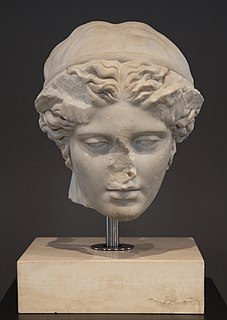 W
WIn Greek mythology, Hypnos is the personification of sleep; the Roman equivalent is known as Somnus. His name is the origin of the word hypnosis.
 W
WIn Greek and Roman mythology, Iphis or Iphys was a child of Telethusa and Ligdus in Crete, born female and raised male, who was later transformed by the goddess Isis into a man.
 W
WIn Greek mythology, King Laius, or Laios of Thebes was a key personage in the Theban founding myth.
 W
WIn Greek mythology, Orestes was the son of Clytemnestra and Agamemnon. He is the subject of several Ancient Greek plays and of various myths connected with his madness and purification, which retain obscure threads of much older ones.
 W
WOrpheus is a legendary musician and prophet in ancient Greek religion. He was also a renowned poet and, according to the legend, travelled with Jason and the Argonauts in search of the Golden Fleece, and even descended into the Underworld of Hades to recover his lost wife Eurydice.
 W
WIn ancient Greek religion and mythology, Pan is the god of the wild, shepherds and flocks, nature of mountain wilds, rustic music and impromptus, and companion of the nymphs. He has the hindquarters, legs, and horns of a goat, in the same manner as a faun and a satyr. With his homeland in rustic Arcadia, he is also recognized as the god of fields, groves, wooded glens and often affiliated with sex; because of this, Pan is connected to fertility and the season of spring. The word panic ultimately derives from the god's name.
 W
WIn Greek mythology, as recorded in Homer's Iliad, Patroclus was a childhood friend, close wartime companion, and the presumed lover of Achilles.
 W
WIn Greek mythology, Pelops was king of Pisa in the Peloponnesus region. His father, Tantalus, was the founder of the House of Atreus through Pelops's son of that name.
 W
WPhaethon, also spelled as Phaëthon, was the son of the Oceanid Clymene and the sun god Helios in Greek mythology. His name was also used by the Ancient Greeks as an alternative name for the planet Jupiter, the motions and cycles of which were personified in poetry and myth.
 W
WPoseidon was one of the Twelve Olympians in ancient Greek religion and myth, god of the sea, storms, earthquakes and horses. In pre-Olympian Bronze Age Greece, he was venerated as a chief deity at Pylos and Thebes. He had also the cult title "earth shaker". In the myths of isolated Arcadia he is related with Demeter and Persephone and he was venerated as a horse, however it seems that he was originally a god of the waters. He is often regarded as the tamer or father of horses, and with a strike of his trident, he created springs which are related with the word horse. His Roman equivalent is Neptune.
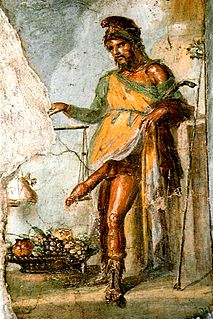 W
WIn Greek mythology, Priapus is a minor rustic fertility god, protector of livestock, fruit plants, gardens and male genitalia. Priapus is marked by his oversized, permanent erection, which gave rise to the medical term priapism. He became a popular figure in Roman erotic art and Latin literature, and is the subject of the often humorously obscene collection of verse called the Priapeia.
 W
WIn Greek mythology, Pylades was a Phocian prince as the son of King Strophius and Anaxibia who is the daughter of Atreus and sister of Agamemnon and Menelaus. He is mostly known for his relationship with his cousin Orestes, son of Agamemnon.
 W
WIn Greek mythology, Sarpedon was a son of Zeus, who fought on the side of Troy in the Trojan War. Although in the Iliad, he was the son of Zeus and Laodamia, the daughter of Bellerophon, in the later standard tradition, he was the son of Zeus and Europa, and the brother of Minos and Rhadamanthus, while in other accounts the Sarpedon who fought at Troy was the grandson of the Sarpedon who was the brother of Minos.
 W
WStaphylus is one of several personages of ancient Greek mythology, almost always associated with grapes or wine:Staphylus, son of wine-god Dionysus and Ariadne. Staphylus, beloved of Dionysus, from the island of Thasos. It is thanks to Dionysus' love for him that Thasian wine is distinguished. Staphylus, in a reconstructed myth, the son of Bacchus and Erigone, where Bacchus assumed the form of a grape which Erigone ate. She immediately realized that she was with child and in time gave birth to a son whom she named Staphylus. Staphylus, husband of Methe and father of Botrys. The family held court in their palace at Assyria. They received Dionysus as guest and held a banquet in his honor. Staphylus died a sudden death the next morning after the feast; to console his wife and son, Dionysus named grape bunches after Staphylus, drunkenness after Methe, and grapes after Botrys. Staphylus, son of Oenomaus, who fought on Dionysus' side against Poseidon in the conflict of the two gods concerning Beroe. Staphylus, son of Silenus, who introduced the practice of mixing wine with water. Staphylus, goatherd of King Oeneus, who discovered wild grapes as he was pasturing the king's goats and saw one of them chewing on the plant. He presented it to Oeneus, who in his turn invented the way of making the grapes into a drink. When Dionysus visited Oeneus, the king served him the new drink. Dionysus suggested that the drink be named oinos (wine) after Oeneus, and the grapes staphyloi after the goatherd Staphylus.
 W
WIn Greek mythology, Tiresias was a blind prophet of Apollo in Thebes, famous for clairvoyance and for being transformed into a woman for seven years. He was the son of the shepherd Everes and the nymph Chariclo. Tiresias participated fully in seven generations in Thebes, beginning as advisor to Cadmus himself.
 W
WTroilus is a legendary character associated with the story of the Trojan War. The first surviving reference to him is in Homer's Iliad, which some scholars theorize was composed by "bards" (aoidoi) and sung in the late 9th or 8th century BC.
 W
WIn ancient Greek religion and myth, the Anemoi were wind gods who were each ascribed a cardinal direction from which their respective winds came, and were each associated with various seasons and weather conditions. They were the progeny of Eos and Astraeus.